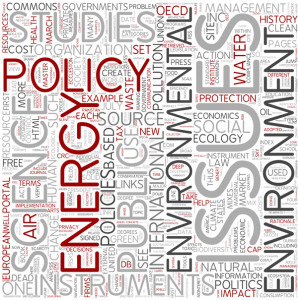

Environmental policy analysis is the analysis of economic, scientific, and other data to provide objective information on environmental issues. The end goals are to create policy recommendations, promote solutions, and build public awareness.
An environmental policy analyst researches the data, relationships, and policy developments surrounding environmental challenges and proposed solutions. Their analyses, which usually involve advanced statistical techniques and analytical models, lead to recommendations for legislation, awareness campaigns, or fundraising approaches. Some environmental policy analysts focus on specific issues such as climate change or environmental health policy. They may work under other job titles such as research associate, advisor, program manager, or regulatory analyst.
Environmental policy analysts provide research and analytical services for policy briefs related to energy sources, climate change, environmental justice, environmental health, and related issues. For example, they gather, research, review, and analyze existing environmental policies, practices, procedures, and laws to determine their environmental and economic impacts. They also analyze and summarize new scientific research for legislators and regulatory agencies, and conduct life-cycle cost analyses of processes, energy sources, and technologies. After thorough analyses of relevant factors, they write reports, policy briefs, and white papers detailing their findings to inform government or environmental groups on issues and strategies such as energy storage or carbon sequestration. They may also present recommendations to government agencies or environmental groups through public relations efforts, awareness campaigns, or meetings.
Many environmental policy analysts work for environment and health organizations at all levels of government, from federal agencies to state, county, and city departments. Others provide services as government contractors or consultants. Many are employed by environmental nonprofit organizations such as the World Wildlife Fund and World Resources Institute. Some work for energy and utility providers. They frequently work together with scientists, engineers, regulators, legislators, citizens, businesses, and nonprofit organizations to craft recommendations and promote initiatives. Most work full time in offices during standard working hours, though overtime may sometimes be required. Jobs in this field are available worldwide, but unsurprisingly, many U.S. jobs with government agencies, think tanks, associations, and policy centers are located in the Washington, D.C. metropolitan area.
FIND SCHOOLS Sponsored ContentEnvironmental policy analysts, who fall under the broader BLS category of environmental scientists and specialists, earned a median salary of $73,230 as of May 2020.*
Senior environmental policy analysts have a breadth of professional experience that enables them to take on more management or administrative tasks related to workgroups then their junior counterparts. While roles do vary, senior policy analysts can expect the following types of duties
BLS projects that the job demand for environmental policy analysts is projected to increase by 8 percent between 2020 and 2030.*
FIND SCHOOLS Sponsored ContentEnvironmental policy analysts need at least a bachelor's degree in environmental policy, environmental studies, environmental science, energy policy, political science, ecology, or a closely related field. Coursework usually includes environmental law and policy, environmental risk assessment, environmental policy analysis, applied research, public administration, political science and the policy-setting process, economics, sustainability science, program assessment, and sociology. Courses in math, statistics, and computer science are essential to data analysis and will help develop the research and analytical skills required for careers in this field. Since environmental policy analysts spend much of their time writing reports and other documents, excellent writing skills, developed through classes in technical communication, writing, and the social sciences, are also critical. Internships with environmental nonprofits and government agencies provide valuable experience while in college.
However, most environmental policy analysts earn graduate degrees. Several colleges and universities offer Master's (M.S. or M.A.) and Doctoral (Ph.D.) degrees in environmental policy, environmental and energy policy, and international environmental policy.
Energy Policy and Climate is presently in a period of growth thanks to the need and desire for international co-operation on creating a sustainable world. In order for professionals who work in this area, we need graduates qualifying in areas that promote the multi-disciplinary approach to balance the data from science against the economic needs and to balance research against real-world problems. These new degrees remedy the knowledge gap between science and law.
*2020 US Bureau of Labor Statistics salary figures and job growth projections for environmental scientists and specialists reflect national data not school-specific information. Conditions in your area may vary. Data accessed September 2021.
What is Wildlife Education? Wildlife education involves teaching students about wildlife. While wildlife education can occur at any age, this description focuses on education at the high school and college levels. Wildlife education involves imparting knowledge about wildlife to future.
Fortunately, we have environmental laws and regulations on the books to reduce the environmental impacts of the things we build. But those laws wouldn't mean much without people who know what they are and how to make sure that new.
Environmental law is a broad area of law that encompasses a range of issues surrounding the environment including water and air quality, hazardous waste, species protection, agriculture, wetlands, biodiversity, waste management, green initiatives, sustainability strategies and alternative energy sources. As.
Engineering Geologists work as advisors to private and public bodies on the natural, environmental and geological threat in real estate development. They will assess whether ground rock is stable enough and whether it is a safe type of rock on.
What Does a Surveyor/Cartographer Do? Surveyors and Cartographers gather data and map the landscapes all around us. Among other things, they are often used for construction, mapping, and geological study. Though Surveyors/Cartographers work towards the same end, the roles they.